|
What is an expert? Throughout my career the functional definition has been, someone I trust who knows more than me. Perhaps that is a fair definition for a mentor, someone who can help you see and reach beyond your current skills and abilities, but this likely isn't a sufficient definition for a subject matter expert. If you are interested in this topic, I think you will enjoy Episode 94 of The DYOJO Podcast as well as some of the quotes included in this blog post. An expert is a man who has made all the mistakes which can be made, in a narrow field. I think there is a humility factor in becoming someone whom others perceive to be an expert. I find that the things that I know well are those things that I learned by failing. It is comforting to know that there are others who view the world in this way as well. If you want to become an expert, the first step is to be willing to fail. The fear of failure is often more dangerous than failure itself. When we fail we can learn and try again. An expert is one who knows more and more about less and less. In order to excel in one area, do you have to prioritize your time and effort? I have heard that the difference between good and great is a small gap, but the difference between good, great, and elite is expansive. John Wooden coached UCLA basketball from 1948 to 1975, during that time his teams competed in a record 38 consecutive NCAA tournament games. Each offseason coach Wooden would study an aspect of the game to help keep himself sharp and hungry to improve. He said, "It's what you learn after you know it all that counts." Expertise is a combination of training, education, and experience. Aside from being a shameless plug to listen to my podcast so that you can hear these words from Bob's mustachioed lips yourself, there is great wisdom in his mantra. Mr. Blochinger has developed his career over many years of being a contractor, flooring installer, and now third-party consultant and expert witness, by applying the principles he shares. Bob has sought out training with practitioners, industry education and certification, and learning from his own experiences as well as that of others in his network. An expert is somebody who is more than 50 miles from home, has no responsibility for implementing the advice he gives, and shows slides. I can remember the first time a company I worked for hired an outside consultant to assist them in growing their business. If memory serves me correctly, I believe Edwin Meese's definition fit the representatives of that business consulting firm perfectly. As we discuss on my podcast, I think this is why the most helpful experts are those who have relevant experience in applying the principles that they are coaching their clients with. An expert is someone who has succeeded in making decisions and judgements simpler through knowing what to pay attention to and what to ignore. Another great mind, author and consultant Lex Sisney, shared a simple principle that has stuck with me. Whenever you are working to improve something, in yourself or your team, ask what must I STOP doing and what must I START doing to achieve the IDEAL. If we combine the concepts in this blog, the roadmap to expertise incudes filtering those things that are (even if only for the moment) distractions so that you can narrow your focus on what is important.
0 Comments
What is The DYOJO?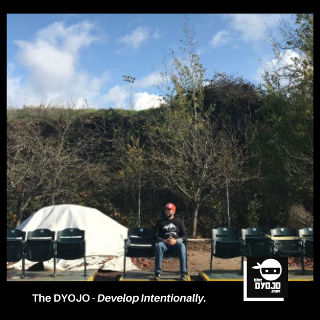 The DYOJO is The Do Your Job Dojo. A dojo is a space dedicated to learning and practicing martial arts. In business teamwork is essential to an organization’s ability to perform at the peak of its capacity. Teamwork must be grounded in trust. the foundation for trust to be built among multiple employees who will be empowered to work with each other, is laid by team members who consistently do their job. In this equation, those in leadership can help this process evolve by clarifying roles and responsibilities for all employees. Personal and Professional DevelopmentIn the original Karate Kid movie, Sensi (teacher/master) John Kreese states the distinctives of the Cobra Kai Dojo:
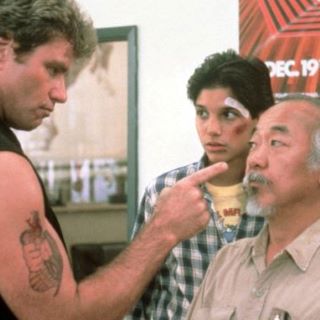 From the example of Karate Kid, we see the difference in the people, process and production of those trained by Sensi Kreese and karate master Mr. Miyagi. By all appearances, the process Mr. Miyagi utilizes for skills training would not produce a championship level fighter and his young apprentice Danny frequently questions his progress. The climax of the movie reveals that the skills and heart of young Danny has been mentored and developed to persevere through rise to the challenge in the face of an opponent is superior by most metrics. Mentorship and Coaching for Achieving Goals.When you commit to studying a martial art, you must find a mentor who you believe will help train you to master the craft you have chose and you must remain engaged in your skills development. The same is true in business. It is your job to pursue personal and professional development so that you can reach your potential. As you grow as a leader, you have a responsibility to repeat the process and help others to achieve their goals. The DYOJO will help you to develop the will, the skill and the chill to succeed. Customized Business Coaching Strategies.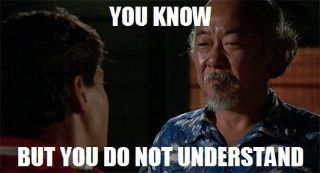 We take the time to listen to your vision, values and goals so that we can assist you to build a strategy for achieving success. You are the hero of your story and our value proposition is to come alongside you to optimize your efforts. The DYOJO provides business coaching services and leadership development in person, online and via remote group training. In the DYOJO we are committed to these core concepts and resources for development:
What services do The DYOJO provide?For growth minded employees in need of direction for continuing their career development:
For new managers who need to elevate their education and training for leadership:
For existing managers looking for tools to help them engage the modern workforce:
For organizations desiring to provide leadership development resources:
Why was The DYOJO Started?The DYOJO helps leaders to intentionally develop their vision and values so that they can build teams that are clear, consistent as well as accountable. We work to help you bridge the gap between where you are and where you want to be as an organization. Through business coaching and leadership development, The DYOJO helps teams to increase their performance in the four key areas of sustainable success - people, process, production and progress. How can The DYOJO help?
Rachel Stewart has good news for all those who feel like they alone are unqualified to achieve their dreams, we all are.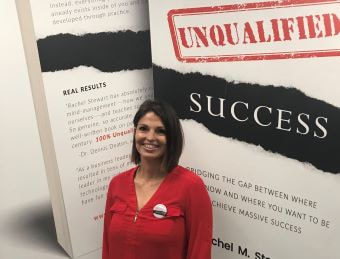 Rachel Stewart author of Unqualified Success Rachel Stewart author of Unqualified Success Positivity makes us feel good, but does it have any power? Author and practitioner Rachel Stewart shares her insights into harnessing the power of the right mindset while pursuing success. Her book, Unqualified Success, is packed with examples from high achievers as well as a uniquely personal story which unfolds throughout the narrative. Rachel provides practical tools for personal development that will empower readers to embrace the journey of bridging the gap from where you are today to where you want to be. Embracing RealityRachel makes herself approachable as an author. Introducing herself and kicking off the tone of the book with the first line, “I am unqualified to write this book.” By admitting this, she seeks to embrace this truth with those who feel as though they are unqualified and are willing to admit it as the start of their journey. The key is that, “The only qualification to get better: being willing to such when you start (p.180).” Starting at ZeroAt the time of writing this book, Rachel was serving as the Executive Vice President of Titan Restoration in Arizona. She started her career in the world of property damage restoration as a stay at home mother returning to the work force. Titan hired Rachel as an unqualified bookkeeper and office manager. As the company grew, so did Rachel and they found themselves reaching a five year goal in less than half that time. Check Your Ego at the DoorAt a critical point of choosing whether to merge with another company or continue on their own, Titan offers Rachel the opportunity to serve as their general manager. As the professional stakes grew the personal feelings of being unqualified did not diminish. It is in many of these uncomfortable moments of inadequacy that Rachel learns to lean into the reality of being unqualified rather than protecting your ego. “This book isn’t about ego. In fact, it’s about the exact opposite. I have been highly unqualified for every position that I have ever held. But I have come to learn that we all are. We are all unqualified today for the life we could have tomorrow (p.9).” From the TrenchesUnqualified Success weaves the stories of names we respect as achievers as well as new characters such as Magno Santos. Magno immigrates from Brazil and the reader is invited to journey with him throughout the book as he pursues the American Dream. Recognizing that we are all unqualified frees us to embrace the process of becoming by changing our perspective. Magno continually propels himself forward in the face of obstacles with the mantra, “If you can know it, I can know it (p.29).” Change of PerspectiveParadigm shift is easier said than done but by doing so we are able to see that our actions do not create out feelings, our thoughts do. Rachel posits that no one is qualified when it comes down to it. The big secret is, “That having the mindset that you are qualified is the biggest determining factor in whether or not you are qualified (p.25).” Cleaning out your thought closet and taking ownership of your thoughts is key to unlocking your potential. Change of Expectation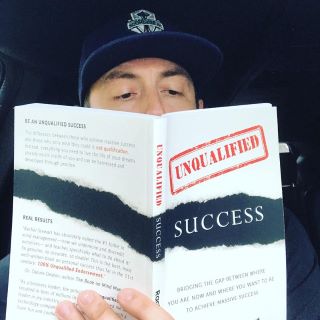 Book Review for Unqualified Success Book Review for Unqualified Success If our self-view is the starting point, the next phase is aligning our expectation. “Too many times we are waiting to arrive before we start (p.48).” Understanding that mastery is a process and practice is the key to pursuit of perfection, we should not discourage ourselves with a defined view of the end. Our battle for becoming is primarily an internal one. The imagery of the two wolves fighting inside each of us presented in Chapter 5 is apt. Which one will win? “The one you feed (p.68).” Change of EnvironmentOrdinary people achieve extraordinary things. Greatness is not the exclusive property of the elite. “The willingness to stay in discomfort for extended periods of time is the essence of grit. It also happens to be an essential key to achieving everything you want (p.83).” As Rachel notes, discomfort is a factor both in failure and in success. Discomfort is the currency and working through it is the journey. When we are tested we must resist our numbing agents and lean into the process of testing our limits. The Big RevealRachel blends a beautiful mix of personal experience, representative stories and practical tools to assist the reader in building a resource base for feeding their growth mindset. She seeks to inspire others to embrace the journey. The book reveals that Magno’s relentless pursuit of bettering himself intersects with Rachel’s family in a very real way when is quality of care lead to an early diagnosis for her father. “Nobody starts out extraordinary. No one begins fully qualified and ready. The minute we understand this principle and it really sinks in, our whole work opens up (p.243).” Are You Ready to be an Unqualified Success?If you dare to read this book, you will find that your excuses melt and your obstacles become opportunities. You should feel unqualified but that should in no way stop you from pursing success. “When we are willing to trade in our need to win or succeed for a need to simply learn and grown instead, we open another world of possibility for achievement (p.186).” You are not alone, you have resources and a tribe of fellow unqualified successes rooting for you.
If you want to achieve greater results, you need to challenge your perspective.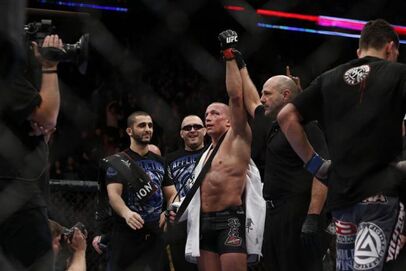 Coach Firas Zahabi and UFC Champion George St Pierre Coach Firas Zahabi and UFC Champion George St Pierre When was the last time you heard, “Common sense isn’t so common anymore”? It probably wasn’t long ago. Was it you that said it? It’s a favorite quip of those in management. Oddly enough, when you are in a position of leadership the most common temptation is to follow the status quo by maintaining practices and platitudes regardless of their effectiveness. Asking the right questions as a leaderWhile leadership may question what their employees are doing at times, the same is true in the reverse. Those further down the ladder may fall prey to following poor examples of work ethic and quality. Conversely, those in leadership are sheep of a higher standing, doing things as they have always been done. The question we should be asking at any level is, “It may be common, but is it successful?” Challenging your perspective as a leaderIn a recent interview with Joe Rogan, Firas Zahabi (see video link below) shares his insights on fighting the standard perspective of working out. Zahabi believes that by focusing on consistency rather than intensity, athletes and health conscious individuals can produce better long term. Firas asks the question, what if your work out could energize you rather than exhaust you? It seems like a wild idea but he reviews several examples of positive results including his own journey as an athlete and trainer. Firas Zahabi interview with Joe RoganFiras Zahabi's accomplishments as a leaderAs a mixed martial arts (MMA) grappling coach, Firas Zahabi is know for his work as the leader of the TriStar Gym in Montreal, Quebec, Canada. Perhaps his most well known student is also one of the greatest MMA fighters of all time, George Saint Pierre also know as GSP. According to MMA Fighting GSP’s accomplishments as a fighter place him firmly in the discussion as one of the greatest fighters of all time (GOAT), “St-Pierre is currently the consensus best welterweight in history, sporting a 25-2 record in the division and having avenged both of his career losses. He currently holds the record for most title bouts (15) and is tied for the record of most wins in UFC history (20). He is also one of only four men to win belts in two separate weight classes.” Refusing to follow along with the status quoZahabi found professionals who were achieving high results by approaching their profession more strategically then their competition. He talks about the importance of having fun while training and redefining what it means to go hard. Firas continues to enjoy what he does and has worked with some of the most successful practitioners in his field. If you invest the twenty minutes in listening to what this coach has to say you may find some inspiration for your personal workouts as well as some nuggets that will help you professionally as well. Having fun while grinding is key to successIf you are having fun while you train than you will want to train more. By creating an atmosphere that is structured but loose, a mundane and grueling part of training can become something that adds energy rather than drains it. Author and CEO coach Lex Sisney reminds us to understand from the basic laws of physics that we have a finite amount of energy both as individuals and organizations. It is to our advantage to find ways to maximize this energy rather than deplete it. Those in positions of leadership should seek means to develop an atmosphere that brings energy to the team. Working your grind rather than being ground outIn the MMA world it is seen as a badge of honor to train hard, Firas challenges the thought process and definition of training hard. Emphasizing that intensity is not the key but consistency. We know it is wise to work smarter not harder and yet we often chose to apply this principle in reverse. Zahabi advocates for maintaining 100% effort while thinking through the approach to the distribution of the work load consistently and strategically over time. If an athlete can get more out of their training using these methods in high intensity sports, perhaps organizations can learn from this approach to maximize their output in highly competitive industries. Playing it safe is not a recipe for successFiras Zahabi’s approach is definitely different than most in his sport and he discusses that. It would be much safer for him to take the same approach and yet had he done so we may not have witnessed the greatness of a fighter like George Saint Pierre. We think that the safest thing to do is not to take risks. In competitive markets from pro sports to the industry that you are in, playing it safe feels much safer than rocking the boat. You may not be a huge success but you also won’t be the nail that sticks out the furthest when the hammer comes down from higher up. When we fail to ask the why, we live without purpose. When we fail to take measured risks, we lead without conviction.
|
AuthorThoughts on personal and professional development. Jon Isaacson, The Intentional Restorer, is a contractor, author, and host of The DYOJO Podcast. The goal of The DYOJO is to help growth-minded restoration professionals shorten their DANG learning curve for personal and professional development. You can watch The DYOJO Podcast on YouTube on Thursdays or listen on your favorite podcast platform.
Archives
March 2023
Categories
All
<script type="text/javascript" src="//downloads.mailchimp.com/js/signup-forms/popup/unique-methods/embed.js" data-dojo-config="usePlainJson: true, isDebug: false"></script><script type="text/javascript">window.dojoRequire(["mojo/signup-forms/Loader"], function(L) { L.start({"baseUrl":"mc.us5.list-manage.com","uuid":"b9016446bd3c6a9f0bd835d4e","lid":"83282ffb9e","uniqueMethods":true}) })</script>
|
Jon Isaacson |
Connect. Collaborate. Conquer.
© COPYRIGHT 2015. ALL RIGHTS RESERVED.
|





 RSS Feed
RSS Feed